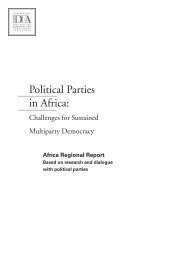Background Document - Danish Institute for Parties and Democracy
Background Document - Danish Institute for Parties and Democracy
Background Document - Danish Institute for Parties and Democracy
Create successful ePaper yourself
Turn your PDF publications into a flip-book with our unique Google optimized e-Paper software.
new Constitution, affirmed that, “we are working hard to write a Constitution that will<br />
protect the dignity of all citizens, especially in the chapter on women’s rights. We are<br />
also working to ensure the right of women to work <strong>and</strong> representation in important<br />
positions in the state” 3 .<br />
Political transitions to democracy are strengthened when genuine participation<br />
<strong>and</strong> representation of women is included on the list of priorities <strong>for</strong> countries in transition.<br />
Too often, this is generally seen as a luxury to be left aside until the other important<br />
democratic values <strong>and</strong> objectives have been achieved. All kinds of women’s<br />
participation <strong>and</strong> representation in transitional politics contain battles over rights,<br />
recognition, participation <strong>and</strong> redistribution of power. The intensity of each battle is<br />
determined by the extent to which consider themselves excluded <strong>and</strong> are conscious of<br />
the degree to which the critical decisions are made by men only.<br />
These battles are a manifestation of the many deeply entrenched obstacles (both<br />
<strong>for</strong>mal <strong>and</strong> in<strong>for</strong>mal/traditional) to women’s political, socio-cultural <strong>and</strong> economic<br />
advancement of women across the world. In many parts of the world, these battles <strong>and</strong><br />
issues are varied <strong>and</strong> complex <strong>and</strong> the challenges <strong>for</strong> women are enormous. While the<br />
participation of women in revolutionary uprisings in the Arab Spring provided opportunities<br />
<strong>for</strong> the active presence of women, women are still battling <strong>for</strong> equality on<br />
all fronts <strong>and</strong> an uphill climb still looms.<br />
UNEQUAL POWER RELATIONS<br />
Evidence abounds to attest that the continued marginalisation of women in decision<br />
making processes in transition countries is in fact part of the broader gender discrimination<br />
<strong>and</strong> the resulting inequalities that span the world from developed countries<br />
such as the Gulf States to low income countries in Sub-Saharan Africa <strong>and</strong> South Asia.<br />
The unequal power relations that impede the effective inclusion of women in transition<br />
countries operate at many levels of society, from the most personal to the highly<br />
public. In some countries the inequalities are clearly blatant in the legal frameworks,<br />
such as constitutions, laws <strong>and</strong> policies.<br />
Across the world, the attitudes about the superiority of men <strong>and</strong> inferiority of<br />
women at the household <strong>and</strong> family level are still very common. Within each region<br />
<strong>and</strong> within countries the magnitude of the attitudes differ reflecting factors such as<br />
culture <strong>and</strong> religion, the rural-urban divide, the political <strong>and</strong> legal system. Due to patriarchal<br />
notions of power, traditional practices <strong>and</strong> religious interpretations, men are<br />
still widely considered the ‘head of the household’ with superior status <strong>and</strong> decisionmaking<br />
authority <strong>and</strong> often greater rights <strong>and</strong> freedoms.<br />
“ Participation<br />
<strong>and</strong> representation of<br />
women is too often seen as a luxury.”<br />
The implications of family <strong>and</strong> household hierarchies <strong>and</strong> stereotyped roles <strong>for</strong><br />
men <strong>and</strong> women are many, including diminished access of women to economic <strong>and</strong><br />
political participation <strong>and</strong> violence against women. Trans<strong>for</strong>med relations between<br />
men <strong>and</strong> women’s at the household <strong>and</strong> family level is critical to their full participation<br />
in <strong>and</strong> contribution in transition processes <strong>and</strong> outcomes in all spheres of society<br />
<strong>and</strong> it will benefit men as well as women. Periods of transition provide opportunities<br />
to create democratic societies by establishing principles of non-discrimination <strong>and</strong><br />
gender equality if the different needs <strong>and</strong> priorities <strong>for</strong> women <strong>and</strong> men are taken<br />
into account during the transitional phases.<br />
3 http://www.ikhwanweb.com/article.php?id=30211<br />
WOMEN IN POLITICS DANISH INSTITUTE FOR PARTIES AND DEMOCRACY PAGE 40
















